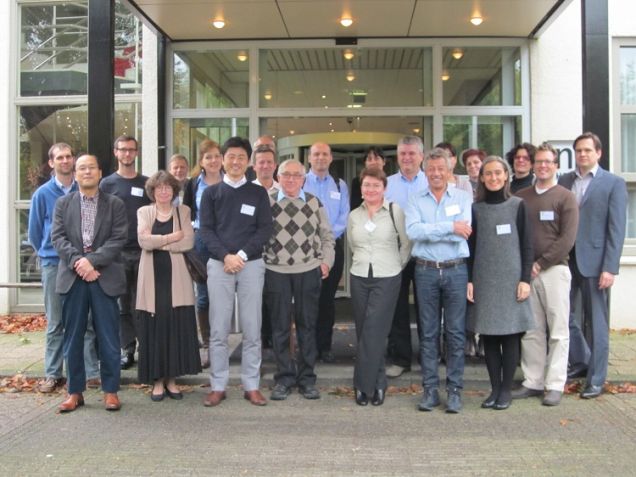Autophagy in Muscular Dystrophies: Translational approach
- Number 201
- Date 8 November 2013
Location: Naarden
This workshop was co-sponsord by the Dutch ZonMw Association
![]()
Organisers: Luciano Merlini (Bologna, Italy), Ichizo Nishino (Tokio, Japan)
Twenty participants from 10 countries (France, Finland, Germany, Italy, Japan, Sweden, The Netherlands, Turkey, United Kindom, and USA) convened for the 201st ENMC International workshop on Autophagy in Muscular Dystrophies. Participants included biochemists, biologists, pathologists, molecular geneticists, neurologists, and paediatricians. The workshop was also attended by Victor Dubowitz as Honorary Member of the ENMC.
Autophagy is a cellular process that helps to maintain cellular energy homeostasis and remove damaged organelles. Research during the last decade has made it clear that malfunctioning or failure of autophagy is associated with a wide range of human pathologies and age-related diseases. In particular dysfunction of autophagy (excessive activation or inhibition) has been recognized as a fundamental pathophysiological mechanism of several muscle disorders.
The first session of the workshop focused on the basic mechanism of autophagy in particular autophagosome formation and regulation, selective types of autophagy (chaperone-assisted and mitophagy), and the role of autophagy in muscle homeostasis. Further sessions concentrated on the current understanding of the role of autophagy in several muscle disorders including Pompe disease, Danon disease, XMEA, laminopathies, GNE myopathy, centronuclear myopathies, myofibrillar myopathies, limb-girdle muscular dystrophies, OPMD, distal myopathies, IBMPFD/VCP myopathy, Vici syndrome, collagen type VI related myopathies, congenital muscular dystrophies (MDC1A and megaconial type), and Duchenne muscular dystrophy. The result of pilot therapeutic approaches in distal myopathies with rimmed vacuoles and of a low protein diet in COL6-related myopathies were presented. A mayor topic was the presentation of the new methods of monitoring autophagy with electron microscopy or in vivo in skeletal muscle, and to monitor autophagic flux in vivo in patients. The last session was dedicated to the provision of guidelines on how to monitor autophagy in clinical trials.
The meeting succeeded in forming a new “muscle autophagy” consortium with the aim to promote and coordinate an international clinical and scientific collaborative effort to accelerate progress toward modulation of dysfunctional autophagy for therapeutic interventions in different muscular dystrophies.
A full report is submitted for publication in Neuromuscular Disorders (pdf).

ENMC
Lt. generaal van Heutszlaan 6
3743 JN BAARN
The Netherlands
+ 31- 35-5480481
enmc@enmc.org
We may request cookies to be set on your device. We use cookies to let us know when you visit our websites, how you interact with us, to enrich your user experience, and to customize your relationship with our website.
Click on the different category headings to find out more. You can also change some of your preferences. Note that blocking some types of cookies may impact your experience on our websites and the services we are able to offer.
These cookies are strictly necessary to provide you with services available through our website and to use some of its features.
Because these cookies are strictly necessary to deliver the website, refusing them will have impact how our site functions. You always can block or delete cookies by changing your browser settings and force blocking all cookies on this website. But this will always prompt you to accept/refuse cookies when revisiting our site.
We fully respect if you want to refuse cookies but to avoid asking you again and again kindly allow us to store a cookie for that. You are free to opt out any time or opt in for other cookies to get a better experience. If you refuse cookies we will remove all set cookies in our domain.
We provide you with a list of stored cookies on your computer in our domain so you can check what we stored. Due to security reasons we are not able to show or modify cookies from other domains. You can check these in your browser security settings.
These cookies collect information that is used either in aggregate form to help us understand how our website is being used or how effective our marketing campaigns are, or to help us customize our website and application for you in order to enhance your experience.
If you do not want that we track your visit to our site you can disable tracking in your browser here:
We also use different external services like Google Webfonts, Google Maps, and external Video providers. Since these providers may collect personal data like your IP address we allow you to block them here. Please be aware that this might heavily reduce the functionality and appearance of our site. Changes will take effect once you reload the page.
Google Webfont Settings:
Google Map Settings:
Google reCaptcha Settings:
Vimeo and Youtube video embeds:
The following cookies are also needed - You can choose if you want to allow them:
You can read about our cookies and privacy settings in detail on our Privacy Policy Page.
Privacy Policy